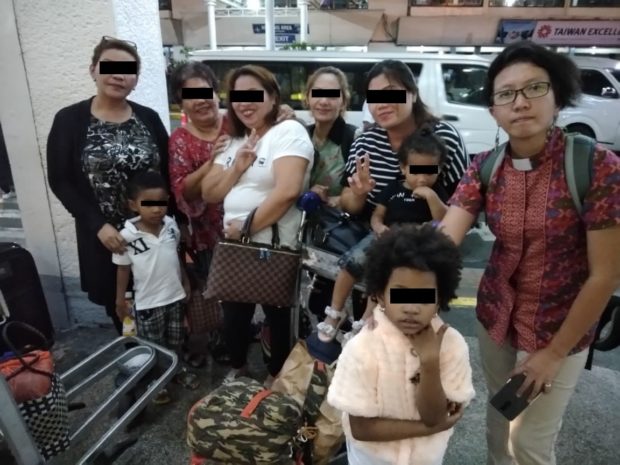‘Our rights as humans were violated:’ Mothers, toddlers arrive in PH after detention in Malaysia
MANILA, Philippines — Upon their arrival in the Philippines, several Filipino mothers, accompanied by their children, has one thing to say after being detained for two weeks in Malaysia: “Our rights as humans were violated!”
The Filipino citizens arrived at the Ninoy Aquino International Airport (Naia) Terminal 1 on Wednesday around 9:40 p.m., migrants group Migrate International said in a statement.
They were detained at the Bukit Jalil Immigration Detention Centre in Kuala Lumpur for two weeks following a raid by its immigration officers at the Plaza Indah Apartment Kajang in Malaysia.
The Filipinos were welcomed at Naia by staff members of Migrante International and Churches Witnessing With Migrants (CWWM).
After their arrival, the Filipinos boarded provincial buses to return to their respective hometowns in Bataan and Laguna.
Claims of abuse
One of the Filipinos detained, Ralyn (not her real name), said that their human rights were violated during their detention, saying that they were fed with “stale and burnt food good for swines.”
“Our rights as humans were violated! The female wardens acted as if they are not mothers themselves. They were vile and mean, treated us like animals. All the children always get terrified when they’re around,” Ralyn said as stated in the Migrante statement.
Other Filipinos who were also detained also claimed that they were not allowed to use sleeping mats, adding that the cardboard they were using as fans were also confiscated.
“We wore the same clothes that we had been wearing on the night we were arrested,” Enny (not her real name) said
Despite their experiences, the Filipinos said they would still return abroad as they are not expecting to get decent-paying jobs in the country.
Migrante International Chairperson Joanna Concepcion called for more job opportunities in the country, as well as changes in the labor policies implemented by the government.
“Aside from the poor level of social services, Filipino workers are stricken by anti-labor policies like contractualization and the regionalization of the minimum wage. Labor conditions have worsened under the Duterte regime,” Concepcion said.
